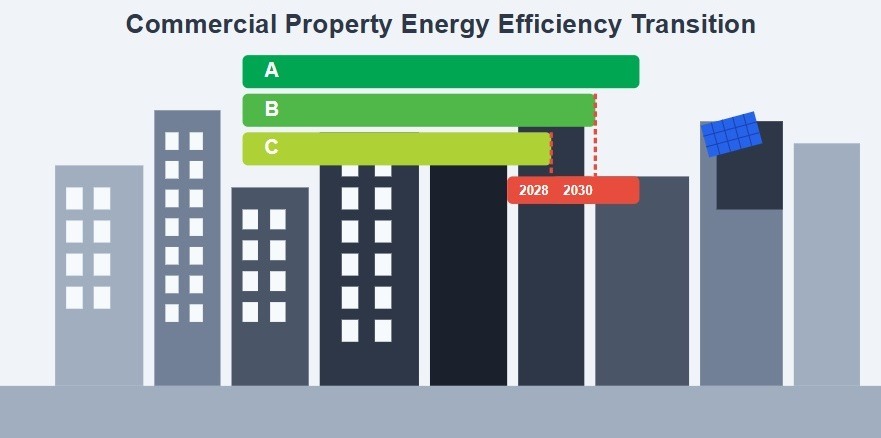Navigating the UK’s Commercial Real Estate Energy Efficiency Challenge
Generation Consulting Limited
5/8/20243 min read


The Current Landscape
The UK commercial real estate sector stands at a pivotal crossroads in its journey toward energy efficiency and decarbonisation. With buildings responsible for approximately 23% of the UK’s total carbon emissions, this sector represents one of the most significant opportunities for meaningful climate action.
Currently, about 60% of commercial buildings in the UK have an Energy Performance Certificate (EPC) rating below B, with a substantial portion falling into the D-G categories. This presents an enormous challenge as we approach critical regulatory deadlines.
The EPC Deadline Countdown
The Minimum Energy Efficiency Standards (MEES) are tightening progressively:
April 2023: Commercial properties must have a minimum EPC rating of E to be leased or have leases renewed
April 2028: All rented commercial properties will require a minimum EPC rating of C
April 2030: The minimum EPC rating requirement will increase to B
These increasingly stringent requirements mean that approximately 80% of the UK’s commercial building stock will need significant energy efficiency improvements within the next six years to avoid becoming “stranded assets” that cannot be legally let
Regional Variations
The energy efficiency challenge varies considerably across UK regions:
London: While having the highest concentration of commercial buildings, it also has the highest proportion of newer, more efficient buildings. However, its historical properties present unique retrofitting challenges.
Northern England: Cities like Manchester and Leeds have initiated ambitious local green building standards that exceed national requirements. The Greater Manchester Local Industrial Strategy includes specific targets for commercial building energy performance.
Scotland: Operating under slightly different regulations with its own EPC system, Scotland has set a more ambitious target requiring all non-domestic buildings to achieve zero carbon status by 2045.
Wales: The Welsh Government’s Prosperity for All strategy includes specific provisions for commercial buildings with unique grant structures available.
Northern Ireland: Has maintained separate building regulations with distinct compliance pathways.
Practical Energy Efficiency Improvements
For commercial property owners facing these challenges, several impactful improvements include:
Building Management Systems (BMS): Modern BMS can reduce energy consumption by 15-20% through intelligent control of heating, cooling, and lighting.
LED Lighting Retrofits: Replacing traditional lighting with LED systems typically yields 60-80% energy savings with payback periods often under two years.
HVAC Optimisation: Upgrading to high-efficiency systems can reduce energy consumption by 30-40%, particularly in older buildings.
Building Fabric Improvements: Enhanced insulation, double/triple glazing, and air tightness measures can significantly reduce heating and cooling demands.
Renewable Energy Integration: On-site generation through solar PV, wind, or heat pumps can dramatically reduce grid dependency and emissions.
Smart Metering and Energy Monitoring: Real-time data collection enables ongoing optimisation and verification of energy-saving measures.
Financial Considerations and Incentives
Several financial support mechanisms are available to help property owners meet compliance requirements:
The Boiler Upgrade Scheme: Provides grants toward the cost of heat pump installations.
Enhanced Capital Allowances (ECAs): Tax relief for investments in qualifying energy-efficient equipment.
Property Assessed Clean Energy (PACE) Financing: Allows building owners to finance energy improvements through property assessments.
Green Lease Clauses: Increasingly popular to share costs and benefits of energy improvements between landlords and tenants.
Energy Efficiency Financing Schemes: Many major banks now offer specific green retrofit financing products with favourable terms.
Local Authority Grants: Many regional authorities offer specific grant programmes for commercial building improvements
Consequences of Non-Compliance
Failing to meet MEES requirements carries significant consequences:
Financial Penalties: Non-compliance can result in fines of up to £150,000, with the penalty value tied to the property’s rateable value.
Inability to Lease: Properties failing to meet minimum standards cannot be legally let, potentially creating significant vacancy and income loss.
Market Devaluation: Non-compliant buildings are experiencing value depreciation of 10-30% compared to energy-efficient equivalents.
Reputational Damage: Increasingly, tenants and investors scrutinise environmental credentials and avoid entities with poor performance.
Financing Difficulties: Lenders are increasingly including energy performance in risk assessments, with less favourable terms for inefficient buildings.
How Generation Consulting Limited Can Help
As the regulatory landscape evolves and deadlines approach, Generation Consulting Limited offers comprehensive services to support your journey to compliance and beyond:
Commercial EPC Assessments and SBEM Calculations: Detailed baseline assessments to determine your current position and improvement potential.
MEES Compliance Reports: Comprehensive analysis including cost-effective compliance pathways.
Display Energy Certificates (DECs): Required documentation for public buildings showing operational energy performance.
Retrofit Strategy Development: Tailored improvement plans that balance capital expenditure against long-term benefits.
Net Zero Carbon Roadmaps: Strategic planning for achieving carbon neutrality across property portfolios.
Grant and Incentive Application Support: Expert guidance to maximise available financial support.
Post-Implementation Verification: Data-driven confirmation that improvements deliver expected results.
The transition to energy-efficient commercial real estate represents both a challenge and an opportunity. While compliance requires investment, it also creates buildings that are more valuable, more attractive to tenants, less expensive to operate, and better positioned for a low-carbon future.
By partnering with Generation Consulting Limited, property owners can navigate this complex landscape with confidence, transforming regulatory compliance from a burden into a strategic advantage.
Address:
124 City Road
London, EC1V 2NX
Registered in England no: 08900037
Contacts
+44 (0) 7453 249 591
enquiry@generation.co.uk
Subscribe to our newsletter


